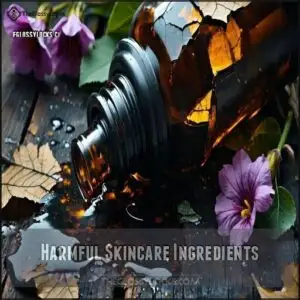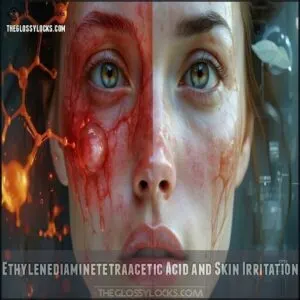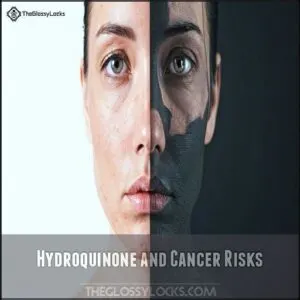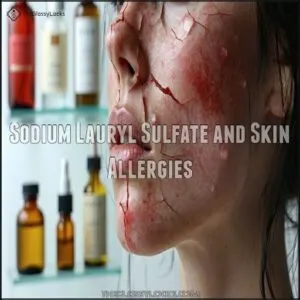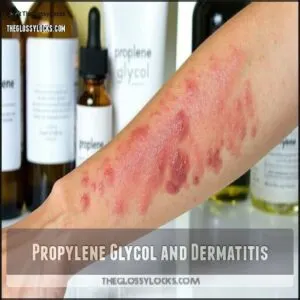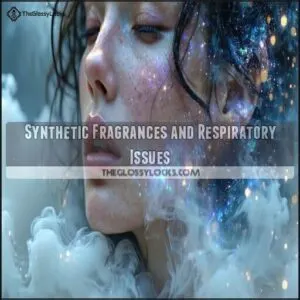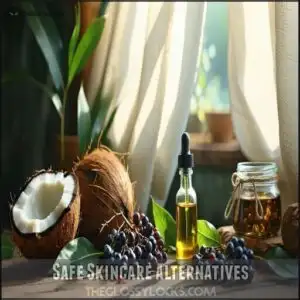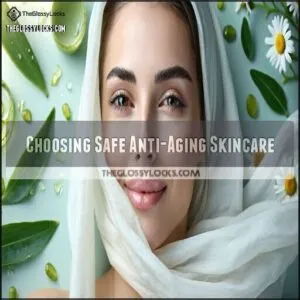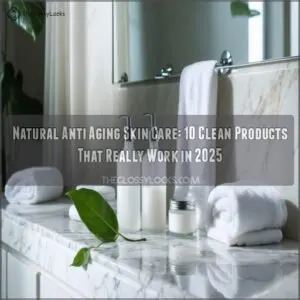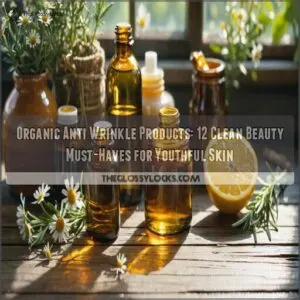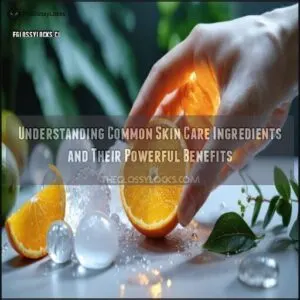This site is supported by our readers. We may earn a commission, at no cost to you, if you purchase through links.
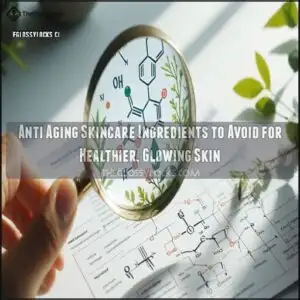
Parabens and phthalates may mess with your hormones, while formaldehyde (yes, the stuff used to preserve things) can irritate skin. Hydroquinone, often found in brightening products, comes with cancer warnings in some countries.
Watch out for oxybenzone in sunscreens—it’s linked to hormone disruption. Even seemingly harmless culprits like synthetic fragrances and sodium lauryl sulfate can trigger allergies or dryness.
The key? Read labels like a detective. Opt for natural, gentle alternatives your skin will thank you for. Curious which ingredients you should embrace next, considering the importance of anti-aging and avoiding harsh chemicals to achieve healthy skin?
Table Of Contents
- Key Takeaways
- Harmful Skincare Ingredients
- Toxic Chemicals to Avoid
- Skincare Ingredient Red Flags
- Safe Skincare Alternatives
- Choosing Safe Anti-Aging Skincare
- Frequently Asked Questions (FAQs)
- What ingredient is best for anti-aging?
- Which skincare ingredients should you avoid?
- What is best for skincare to prevent aging?
- What skincare products should you never mix?
- How often should anti-aging products be replaced?
- Do anti-aging ingredients work at all ages?
- Can diet affect anti-aging skincare efficacy?
- Are anti-aging product claims scientifically verified?
- Should anti-aging routines change with seasons?
- Conclusion
Key Takeaways
- You should avoid parabens and phthalates in skincare products as they’re linked to hormone disruption, which can affect your long-term reproductive health and potentially contribute to issues like weight gain and breast cancer.
- Watch out for formaldehyde, hydroquinone, and oxybenzone in your anti-aging products—these ingredients are associated with skin irritation, potential cancer risks, and environmental harm to coral reefs.
- Don’t be fooled by silicones and synthetic fragrances that give temporary smoothness but can lead to skin dehydration, pore clogging, and respiratory issues over time.
- You’ll get better results by switching to natural alternatives like tea tree oil, coconut oil, and elderberry extract—these provide effective anti-aging benefits without the harmful side effects.
Harmful Skincare Ingredients
In the context of skincare, not all ingredients are as harmless as they seem, and some can do more harm than good.
Understanding which components, like parabens and phthalates, pose risks to your skin and health is key to making safer product choices.
Parabens and Their Risks
Parabens, including methylparaben and butylparaben, are common preservatives in anti-aging products, but they’re tied to hormone disruption through their impact on estrogenic receptors.
Methylparaben and butylparaben, lurking in anti-aging products, disrupt hormones and may impact long-term health—opt for safer, natural alternatives.
Studies link parabens to weight gain, breast cancer cells, and endocrine disruption.
For sensitive skin or long-term reproductive health concerns, opt for safer paraben alternatives like natural ingredients to minimize skin sensitivity and avoid these potential dangers.
Phthalates and Hormone Disruption
Phthalates, sneaky chemicals in many cosmetics, disrupt your endocrine system and mimic hormones, causing fertility impacts and earlier puberty in girls.
Phthalates silently mimic hormones, disrupting endocrine balance and posing fertility risks—hidden dangers lurking in everyday cosmetics.
Their presence often hides in "fragrance" on product labeling due to regulatory loopholes.
Safe options include mineral based sunscreens.
- Linked to pregnancy loss and decreased fecundity
- Contribute to hormonal disruption
- Found in plastics, lotions, and perfumes
- Pose phthalate dangers to thyroid health
- Often unregulated despite risks
Formaldehyde and Skin Irritation
Formaldehyde is a sneaky culprit in irritating skincare ingredients, often hiding in shampoos and creams.
It causes skin irritation, redness, and even dermatitis, especially for sensitive users.
Chronic formaldehyde exposure may develop allergies over time.
To avoid anti-aging ingredient dangers, look for formaldehyde alternatives on labels.
Formaldehyde regulations are limited, so staying informed helps protect your skin.
Aluminum and Carcinogenic Effects
Aluminum in skincare, especially antiperspirants, raises concerns due to potential links to cancer and aluminum toxicity.
Some studies suggest it may disrupt hormones and encourage cancer cell migration, though definitive evidence is lacking.
With its neurological effects and possible role as a carcinogen, it’s best to avoid aluminum-based products.
Instead, choose safe alternatives like natural or organic options.
Toxic Chemicals to Avoid
You mightn’t realize it, but some skincare ingredients can do more harm than good, even in products claiming to fight aging.
By avoiding toxic chemicals like BHA, EDTA, hydroquinone, and oxybenzone, you can protect your skin and overall health for the long term, which is a key aspect of using skincare products wisely.
Butylated HydroxyAnisole and Butylated Hydroxytoluene
BHA and BHT, often used as preservatives, carry serious risks.
Known for their antioxidant controversy, these harmful skincare ingredients are classified as possible carcinogens and linked to hormone disruption.
Commonly found in anti-aging products like lipsticks, they may trigger allergic reactions.
These chemicals also have bioaccumulation potential, posing risks to aquatic environments.
To avoid skincare ingredient dangers, opt for safe alternatives such as natural antioxidants, ensuring healthier, glowing skin.
Ethylenediaminetetraacetic Acid and Skin Irritation
Following harsh preservatives, Ethylenediaminetetraacetic Acid (EDTA) demands your attention.
Found in many skincare formulas, this chelating agent can trigger EDTA sensitivity, causing skin irritation and dryness.
Its irritation mechanisms stem from exposure routes like lotions or shampoos.
While deemed safe at low levels, it’s smarter to avoid skincare ingredients that sensitize skin—look for alternative chelators in safer, non-toxic skincare products.
Many people find that aloe vera reduces inflammation when applied topically, which can help with skin irritation and promote the use of non-toxic skincare products.
Hydroquinone and Cancer Risks
Hydroquinone is often promoted for skin lightening, but it comes with risks.
Its carcinogenicity raises concerns about long-term effects, including skin cancer. Studies link it to ochronosis—a condition causing skin darkening instead of lightening.
Watch for these signs:
- Increased sensitivity or redness.
- Persistent irritation.
- Unusual patchy discoloration.
Prioritize safe alternatives like Vitamin C or licorice extract for brighter, healthier skin.
Oxybenzone and Hormone Disruption
Oxybenzone, a common sunscreen ingredient, acts as a hormone disruptor, impacting the endocrine system and causing reproductive issues.
Linked to coral reef damage, it’s even detected in human breast milk.
To avoid such antiaging ingredient dangers, choose safe sunscreens without oxybenzone or opt for natural alternatives.
Better sunscreen regulation is essential to address these endocrine effects and protect long-term health.
Skincare Ingredient Red Flags
When scanning skincare labels, it’s essential to recognize ingredients that can harm your skin or overall health.
Being aware of red flags like synthetic fragrances or harsh chemicals helps you make safer choices for a glowing, healthy complexion.
Sodium Lauryl Sulfate and Skin Allergies
Sodium lauryl sulfate (SLS) is a harsh surfactant often found in cleansers, known for skin irritation risks. If you’ve got sensitive skin, watch out—it can strip natural oils, causing itching or redness.
A key sign can be recurring canker sores, potentially indicating sensitivity.
Common allergy symptoms might include:
- Redness or burning.
- Tiny bumps or hives.
- Dry or scaly patches.
- Increased irritation with warm water.
- Trouble healing post-rash.
Look for SLS alternatives.
Propylene Glycol and Dermatitis
Propylene glycol, a common humectant, hydrates skin but can trigger dermatitis symptoms like redness or hives, especially in sensitive individuals.
Even tiny concentrations may cause skin irritation or an allergic reaction.
To avoid harmful skincare ingredients, stick to alternative humectants like glycerin or coconut oil. Always patch test new products, as this ingredient highlights why skincare ingredients to avoid should be prioritized.
Silicone and Skin Dehydration
Silicone might feel smooth, but it’s secretly a drying skincare ingredient.
Its occlusion blocks moisture and nourishing ingredients, setting up a dehydration mechanism that dulls your skin over time.
By trapping dirt and bacteria, it also causes pore clogging and breakouts.
Avoid silicone for healthier, long-term effects, and opt for alternative hydration from natural, breathable ingredients instead.
Some silicones, like trisiloxane for hair, provide a silky texture.
Synthetic Fragrances and Respiratory Issues
Synthetic fragrances may smell nice, but they’re often made with chemicals that can irritate sensitive lungs.
Fragrance inhalation risks include triggering asthma symptoms or worsening respiratory sensitivities.
Scent chemical safety isn’t guaranteed, as artificial fragrance blends are rarely fully disclosed.
To avoid respiratory issues, opt for fragrance-free alternatives, which can help prevent triggering asthma symptoms and are a safer choice. Your nose—and lungs—will thank you for making this choice.
Safe Skincare Alternatives
You don’t need harsh chemicals to keep your skin healthy and radiant.
Safe alternatives like tea tree oil, coconut oil, and elderberry extract offer effective, science-backed benefits without putting your skin at risk.
Natural Ingredients for Healthy Skin
Natural ingredients like plant-based actives offer botanical benefits without the risks of toxic skincare ingredients.
Organic skincare formulas rich in herbal remedies, such as elderberry extract or plant-based oils, nourish and protect your skin.
For those seeking effective solutions, consider exploring options for natural antiaging skincare.
Swap harsh products for these natural alternatives to support antiaging skincare goals, and embrace DIY recipes or pre-made options for safer, glowing skin that thrives, using natural alternatives.
Tea Tree Oil and Antimicrobial Effects
Tea tree oil offers impressive antimicrobial effects, making it a go-to for combating bacteria and fungi.
Its benefits shine in antiaging skincare by addressing skin conditions without harsh chemicals.
Use products with proper oil concentration to avoid skin sensitivity, and apply sparingly.
For acne-prone areas, tea tree’s antimicrobial mechanisms work well, tackling breakouts while being a safer alternative to harsh ingredients to avoid.
Some find it useful to reduce inflammation associated with acne scars.
Coconut Oil and Moisturizing Properties
Coconut oil, derived from Cocus nucifera, is a powerhouse for hydration and soothing the skin.
Its benefits include strengthening the lipid barrier and providing eczema relief.
For glowing skin:
- Use coconut oil as a natural moisturizer.
- Try oil cleansing to gently remove impurities.
- Check for pore-clogging ingredients if acne-prone.
- Avoid over-application to prevent comedogenic buildup.
Many people use coconut oil products for skincare.
Elderberry Extract and Antioxidant Benefits
Elderberry extract, known for its powerful antioxidant properties, helps protect your skin from damage caused by free radicals.
Clinical evidence supports its role in reducing inflammation and promoting collagen production, essential for antiaging skincare.
Extract forms like serums or creams make it easy to incorporate, and adding elderberry benefits to your routine is a smart way to avoid harsh ingredients while promoting healthier, glowing skin.
Choosing Safe Anti-Aging Skincare
You’ve got plenty of options in the area of anti-aging products, but not all are created equal.
Choosing safer skincare means avoiding harsh chemicals, prioritizing natural ingredients, and consulting a dermatologist for personalized advice.
Avoiding Harsh Chemicals and Toxins
It’s tempting to try every product promising youth, but too many layers increase toxin absorption.
Harmful chemicals like formaldehyde or parabens in antiaging skincare undermine health.
Stick to minimalist routines and ingredient awareness:
- Choose “safer sunscreens” with mineral-based formulas.
- Avoid toxic skincare ingredients, including synthetic fragrances.
- Read labels for ingredients to avoid—like phthalates or silicones—to protect your skin long-term.
Consulting a Dermatologist for Guidance
Don’t navigate skincare alone—consult a dermatologist for expert skin analysis and personalized skincare plans.
They provide professional product recommendations, prescription-strength options, and dermatological advice suited to your needs.
Whether managing skin conditions like rosacea or simply optimizing anti-aging routines, a thorough skin evaluation guarantees personalized recommendations.
Trust their expertise to identify what truly works for your unique skin.
| Benefit | Dermatologist’s Role |
|---|---|
| Expert skin analysis | Assesses unique skin type and needs |
| Personalized plans | Designs a customized regimen |
| Prescription options | Offers stronger, targeted treatments |
| Skin condition care | Diagnoses and treats specific issues |
| Product advice | Recommends effective, safe products |
Prioritizing Natural and Organic Ingredients
Choosing organic skincare isn’t just trendy—it’s smart.
Products with Natural Efficacy and Organic Certification reduce exposure to harmful ingredients.
Look for brands committed to Sustainable Packaging and transparent Ingredient Sourcing.
Avoid bad anti-aging ingredients by exploring natural options like DIY Skincare when possible.
Discover natural skincare solutions for healthier skin.
Organic skincare prioritizes your health while dodging toxic skincare ingredients.
Small swaps can make a big difference!
Frequently Asked Questions (FAQs)
What ingredient is best for anti-aging?
Like time-defying wizards in a bottle, retinoids reign supreme in anti-aging.
You’ll find they’re scientifically proven to reduce wrinkles and stimulate collagen production.
Vitamin C follows closely as your skin’s defensive shield against aging.
Which skincare ingredients should you avoid?
You should avoid parabens, synthetic fragrances, SLS, formaldehyde, phthalates, oxybenzone, hydroquinone, and aluminum in skincare. These ingredients can cause irritation, hormonal disruption, and potentially more serious long-term health issues.
What is best for skincare to prevent aging?
Studies show 90% of skin aging comes from sun exposure.
You’ll get best results using sunscreen daily, retinoids at night, vitamin C serums in the morning, and peptides that boost collagen production.
What skincare products should you never mix?
You’ll want to keep retinol and AHAs/BHAs separate from vitamin C, and never mix benzoyl peroxide with retinol. Also avoid using multiple exfoliants together, as they’ll irritate your skin.
How often should anti-aging products be replaced?
Nearly 70% of anti-aging products lose efficacy after 12 months.
You’ll need to replace most serums every 6-12 months, retinoid creams every 9-11 months, and moisturizers within 12 months.
Always check for changes in texture, color, or smell.
Always be aware of the texture to ensure the product remains effective.
Do anti-aging ingredients work at all ages?
The effectiveness of anti-aging ingredients varies across age groups. You’ll see best results when starting preventative care in your 20s, while deeper treatments become more beneficial as you get older.
Can diet affect anti-aging skincare efficacy?
Your diet directly impacts your skin’s ability to absorb and utilize anti-aging products.
Nutrients like vitamins C, E, and omega-3s enhance collagen production and cell repair when paired with topical treatments.
Are anti-aging product claims scientifically verified?
Most anti-aging claims aren’t rigorously verified.
The FDA doesn’t regulate skincare products like medications, so companies don’t need scientific proof before making claims.
You’ll find marketing often outpaces actual evidence for effectiveness.
Should anti-aging routines change with seasons?
Like a wardrobe for your face, your skincare should change with seasons.
You’ll need richer moisturizers in winter and lighter formulations with increased sun protection in summer to address changing humidity levels and environmental stressors, which can be considered environmental stressors.
Conclusion
Will you transform your skincare routine today?
The journey to ageless beauty doesn’t require harsh chemicals—it demands awareness.
By identifying anti aging skincare ingredients to avoid like parabens, formaldehyde, and oxybenzone, you’re already halfway to healthier skin.
Remember, what you leave out is just as important as what you include.
Your skin deserves gentle, natural alternatives that nourish rather than harm.
Make informed choices, and watch your complexion thank you with a natural, youthful glow.

